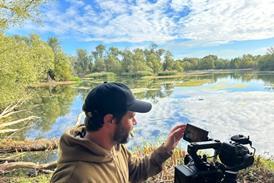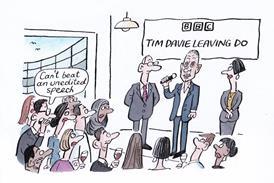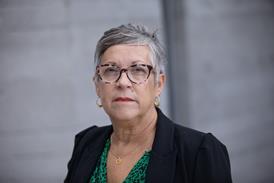As light entertainment leviathan programmes boost some studios, others are struggling. Andy Stout finds that flexibility and offering added extras are key to pulling in projects.

The word ‘studio’ comes from the Latin studere, meaning to study - especially with zeal - and with the Saturday night light entertainment leviathans such as Britain’s Got Talent dominating schedules, there’s been no shortage of zealous action in the studios sector recently.
“I think we were the first to experience the recession, without even realising it,” says Maidstone Studios general manager Kenton Oxley. “Now though, we have more bookings pencilled in the diary than we had in 2007, which was a very strong year for us. So maybe we’re coming out
of it first too.”
If the fabled green shoots of recovery are popping up in Maidstone, the picture across the rest of the sector is more mixed. Comments from studio heads about the effects of the downturn range from “no impact”, to “definitely quieter”. There is little pattern to this disparity, though a positive response is more likely to come from a studio with a big Saturday night show contract in its pocket. While studio-based sitcoms may be gaining in importance, and there is a general feeling there are more pilots than ever across the genres this year, light entertainment is still the driving force.
“The Saturday night event show is not going anywhere and producers want to do it in a studio. If they go to a space such as the 02 or the NEC, they lose the control they can maintain in a studio,” says Paul Baker, sales director at The Pinewood Group, which had a 5% growth in TV income last year (and, incidentally, currently has five A-list Hollywood films on its stages).
One effect of the downturn is that commissioning cycles are being shortened. Studios report that they are getting final sign-off on projects much later - often two to three weeks in advance of shooting instead of the customary two to three months.
Measured against this has to be the tendency for indies to block book 100-plus shows at a time in a bid for bulk discounts and in order to achieve clear visibility on future costs.
There is also a trend towards medium-budget productions trying to work more effectively in smaller spaces. However, rates seem to be holding, despite the usual downward pressure. “Rates crop up in conversation earlier than they once would have, and there’s always negotiation, but budgets don’t seem to have dropped too far,” says Fountain Studios managing director Mariana Spater.
Extra incentives
Productions’ expectations of studios haven’t changed noticeably over recent years, according to Kathy Schulz, director of studio service and client liaison at The London Studios.
“It needs to be the right size for their production, in the right location to ensure accessibility for their talent and to deliver good audiences with
the right demographic, have a reliable technical infrastructure including connectivity for live transmissions and offer great customer service - and all at the right price, of course,” she says.
What has changed are the extra services studios can provide, either at a price or bundled in as a sweetener.
Ancillary rooms (production offices, dressing rooms, hospitality and communal areas etc) are gaining in importance, as is the ability to accommodate spin-offs from the larger light entertainment productions. “We hosted It Takes Two in Studio 11 with Strictly Come Dancing continuing in Studio One,” says Paul Austin, joint head of commercial management, BBC Studios and Post Production. “These smaller studio facilities are ideal for productions with a smaller budget, which can still benefit from the same talent and expertise and enjoy proximity to the sister show.”
Post-production services are another increasingly popular value add. Maidstone’s Oxley estimates his nine Symphony suites can undercut Soho by up to 70%. At 3 Mills, studio executive Derek Watts is actively looking into offering onsite post services via a third party (although he can do little until the London Development Agency report on the possible redevelopment of the site is published towards the end of the year). “The whole package operation - studios and post - is very attractive to productions,” he says.
Pinewood is also pushing its post services, with a current unnamed BBC production breaking new ground for tapeless workflows in the UK by capturing straight to EVS disc recorders, with material then stored on Unity and immediately available for post. It’s also investing in what it has dubbed a Studio Docking System - essentially a large, mobile gallery that it can locate on any of its stages - which is due to launch in early 2010.
Tailored approach
This dovetails with reports of a growth in requests from production companies to quote for dry hiring studios. While not popular with traditional TV studios (the margins on hiring out a studio as a four-wall space are significantly lower than the full package), it is increasingly setting a benchmark with which they have to be competitive.
“People often have more kit in a studio than they need, which works out more expensive,” says Watts. “Dry hire gives them more flexibility in tailoring their budgets.”
Value for money is as important as ever. The forecasts for the rest of 2009 are as diverse as opinions on the year so far, with some predicting boom and some predicting, if not quite bust, then certainly tough times.
However, there is optimism- in the South East at least - that the multiple closures of 2008 might have dampened supply to sustainable levels. The picture remains uneven though, best illustrated by the stories of two studios on opposite coasts. The initial feasibility study by South West Screen on developing studio facilities in Bristol in the wake of Casualty’s departure to Cardiff reports next week. According to SWS production services manager Fiona Francombe, the study is “very positive”.
Meanwhile, Screen Yorkshire has ruled out making a rescue bid for ITV’s Kirkstall Road Studios in Leeds. As a result, they lie mothballed and moribund, which goes to show that all the zeal in the world won’t save studios if the money isn’t there.


























No comments yet